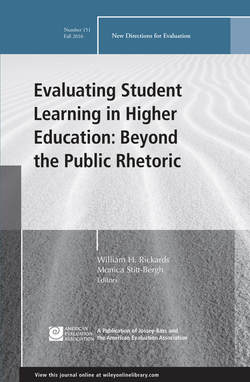Описание книги
Evaluation has played a fundamental role throughout the history of higher education. It has been key to institutional missions and for accountability concerns for public funding policy and fiscal oversight. In the last 30 years, there has been focused attention on the quality of education and student learning. Campuses have stepped up their initiatives to evaluate educational outcomes—and communicate these to their constituencies—just as regional, state, and national efforts have emerged regarding assessment of learning outcomes. In this context, various methods and approaches to evaluative inquiry have emerged to support efforts to increase the effectiveness and efficiency of instructional practice and curriculum for higher learning. This edition examines perspectives on evaluation studies addressing higher education learning—from program- to institution-based studies and critiques of practice—to document successes and identify significant challenges that face evaluators and the collaborating educators in the continuing development of higher education. This examination represents both an investigation into the particular insights that evaluative inquiry contributes to the scholarship and practice of higher education and a reflection on the evaluation expertise that can be applied across contexts of professional practice and program development. This is the 151st issue in the New Directions for Evaluation series from Jossey-Bass. It is an official publication of the American Evaluation Association.
